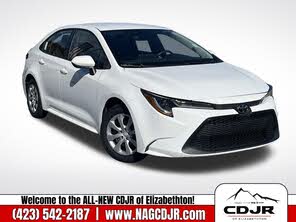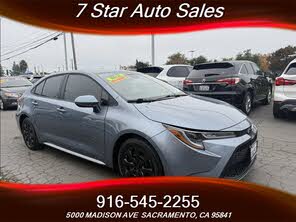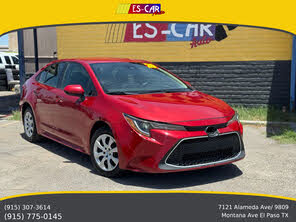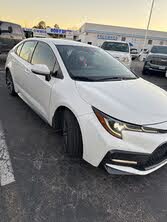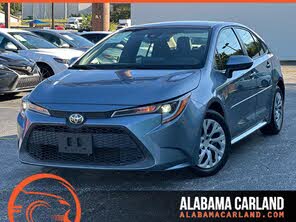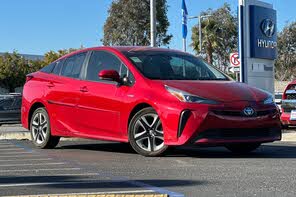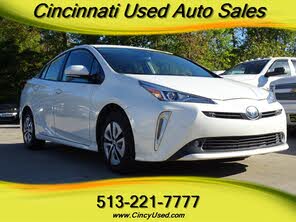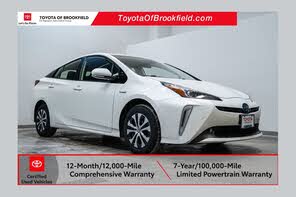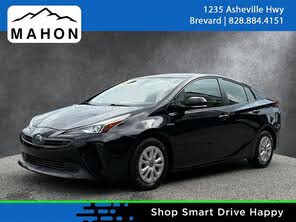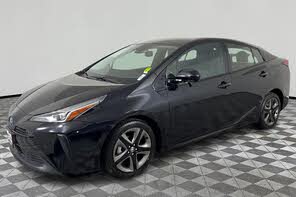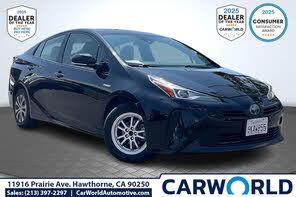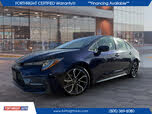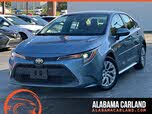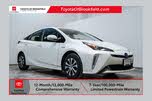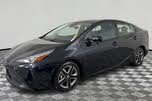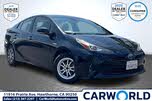2020 Toyota Corolla vs 2020 Toyota Prius
Overview | |
MSRP$19,600 | MSRP$24,325 |
Listings1367 | Listings108 |
Ratings & Reviews | |
User Reviews | User Reviews |
Expert reviews7.0 out of 10 | Expert reviews7.5 out of 10 |
Pros
Cons
| Pros
Cons
|
2020 Toyota Corolla Reviews SummaryIf ever a car was to be described as an appliance, the Toyota Corolla was it. Cheap to buy, dependable as a sunrise, thrifty with fuel, and roomy enough for a frugal family, the Corolla faithfully delivered its owners to their destinations without a hint of fuss... or emotion. That changes with the redesigned 2020 Toyota Corolla, which adds a sense of style and a bit of thrill to its longstanding mission. | |
2020 Toyota Prius Reviews SummaryEver heard of an eponym? It’s a brand or product that is so popular that it’s come to define its respective market. Think of Kleenex for tissues or Band-Aid for medical bandages. For hybrids, the Toyota Prius has ascended to near-eponym status. It was one of the first—and remains one of the most popular—hybrids ever made. As automakers across the industry are rolling out more hybrid models, the Prius continues to be the standard-bearer of this genre. This is largely due to the fact that the Prius is a dedicated hybrid, rather than a hybrid variant of an existing model. Throughout the industry, different companies are taking different approaches to alt-fuel vehicles, including full-electric and hydrogen fuel cell powertrains. The Prius endures as the leader in hybrid power due to a focus on fuel efficiency that doesn’t compromise on style, drivability, and versatility. So how does the Prius hold its ground as more players enter the fray? Read on to find out. | |
No video found | |
Popular Features & Specs | |
Engine1.8L 139 hp I4 | Engine1.8L 121 hp I4 Hybrid |
Drive TrainFWD | Drive TrainFWD |
Seating Capacity5 | Seating Capacity5 |
EV Battery Capacity | EV Battery Capacity0.7 kWh |
MPG City30 | MPG City58 |
MPG Highway38 | MPG Highway53 |
Engine | |
Engine Name1.8L 139 hp I4 | Engine Name1.8L 121 hp I4 Hybrid |
DrivetrainFWD | DrivetrainFWD |
Fuel Economy | |
EV Battery Capacity | EV Battery Capacity0.7 kWh |
MPG City30 | MPG City58 |
MPG Highway38 | MPG Highway53 |
Interior | |
Seating Capacity5 | Seating Capacity5 |
Safety | |
Front Crash Overall5 | Front Crash Overall4 |
Side Crash Overall5 | Side Crash Overall5 |
Dimensions & Capacity | |
Cargo Space13.1 cu ft | Cargo Space27.4 cu ft |
Curb Weight2910 lbs | Curb Weight3010 lbs |
Height56.5 in | Height57.9 in |
Length182.3 in | Length180.0 in |
Width70.1 in | Width69.3 in |
Wheelbase106.3 in | Wheelbase106.3 in |
Maximum Payload825 lbs | Maximum Payload825 lbs |
Number of doors4 | Number of doors4 |
Overview | ||
MSRP | $19,600 | $24,325 |
Listings | ||
Ratings & Reviews | ||
User reviews | ||
Expert reviews | 7.0 out of 10Read full review | 7.5 out of 10Read full review |
Pros & cons | Pros
Cons
| Pros
Cons
|
Summary | If ever a car was to be described as an appliance, the Toyota Corolla was it. Cheap to buy, dependable as a sunrise, thrifty with fuel, and roomy enough for a frugal family, the Corolla faithfully delivered its owners to their destinations without a hint of fuss... or emotion. That changes with the redesigned 2020 Toyota Corolla, which adds a sense of style and a bit of thrill to its longstanding mission. | Ever heard of an eponym? It’s a brand or product that is so popular that it’s come to define its respective market. Think of Kleenex for tissues or Band-Aid for medical bandages. For hybrids, the Toyota Prius has ascended to near-eponym status. It was one of the first—and remains one of the most popular—hybrids ever made. As automakers across the industry are rolling out more hybrid models, the Prius continues to be the standard-bearer of this genre. This is largely due to the fact that the Prius is a dedicated hybrid, rather than a hybrid variant of an existing model. Throughout the industry, different companies are taking different approaches to alt-fuel vehicles, including full-electric and hydrogen fuel cell powertrains. The Prius endures as the leader in hybrid power due to a focus on fuel efficiency that doesn’t compromise on style, drivability, and versatility. So how does the Prius hold its ground as more players enter the fray? Read on to find out. |
Video | No video found | |
Popular Features & Specs | ||
Engine | 1.8L 139 hp I4 | 1.8L 121 hp I4 Hybrid |
Drive Train | FWD | FWD |
Seating Capacity | 5 | 5 |
EV Battery Capacity | 0.7 kWh | |
MPG City | 30 | 58 |
MPG Highway | 38 | 53 |
Engine | ||
Engine Name | 1.8L 139 hp I4 | 1.8L 121 hp I4 Hybrid |
Drivetrain | FWD | FWD |
Fuel Economy | ||
EV Battery Capacity | 0.7 kWh | |
MPG City | 30 | 58 |
MPG Highway | 38 | 53 |
Interior | ||
Seating Capacity | 5 | 5 |
Safety | ||
Front Crash Overall | 5 | 4 |
Side Crash Overall | 5 | 5 |
Dimensions & Capacity | ||
Cargo Space | 13.1 cu ft | 27.4 cu ft |
Curb Weight | 2910 lbs | 3010 lbs |
Height | 56.5 in | 57.9 in |
Length | 182.3 in | 180.0 in |
Width | 70.1 in | 69.3 in |
Wheelbase | 106.3 in | 106.3 in |
Maximum Payload | 825 lbs | 825 lbs |
Number of doors | 4 | 4 |
The 2020 Toyota Corolla wasn’t traditionally described as pretty; rather, many thought it shared the somewhat aggressive, alien-like appearance of other modern Toyotas. Particularly in the XSE or SE trims, the Corolla could look quite striking, especially when sporting the attractive Celestite paint color. Despite its bold headlamps, the overall exterior was thought of as a solid and sporty compact sedan. Over time, people might have grown accustomed to its look just as they did with the Honda Civic or even the Demogorgon from “Stranger Things.”
Inside, the Corolla’s cabin received noticeable improvements in perceived quality. Glossy, hard plastics were largely replaced by soft-touch surfaces, with remaining plastic panels given a less shiny finish. This transition added a touch of sophistication to the interior, likened to upgrading from a McDonald’s Happy Meal toy to something more respectable. However, the economy-car roots showed in the transmission shifter, which lacked the solid feel seen in competitors like Hyundai or Kia models.
The 2020 Corolla had a starting price of $19,600 for the L trim, with higher trims like the XSE, which included a top option package, costing around $28,800. The hybrid version, promising 52 mpg in combined driving, catered to those prioritizing fuel efficiency.
In contrast, the 2020 Toyota Prius retained its iconic jellybean-like shape, optimized for aerodynamics over generations. This design philosophy stuck with Toyota, allowing the Prius to maintain its remarkable drag coefficient. Current styling tweaks aimed to make it appear more sedan-like, though it still featured a practical hatchback design.
The Prius’s interior was futuristic, embracing a central instrument panel location for over two decades. This design made the Prius distinct, if not universally loved. The cabin layout emphasized user-friendliness, with ample space enhanced by clever storage solutions and a continuous focus on ergonomic comfort.
The available trims were L Eco, LE, XLE, and Limited. The L Eco trim started feature-packed with 15-inch alloy wheels, automatic climate control, cloth upholstery, and more, increasing in luxury and tech with higher trims. The 2020 Edition added limited-run unique styling for those seeking a special variant. Ultimately, the Prius’s design was practical and modern, ensuring it remained competitive in a crowded market.


















The 2020 Toyota Corolla equipped its L, LE, and XLE trims with a 1.8-liter 4-cylinder engine producing 139 horsepower. A continuously variable transmission (CVT) powered the front wheels, set on 16-inch all-season tires. While reliable, this setup wasn’t thrilling, akin to a bland turkey sandwich without mayo.
SE and XSE trims significantly upped the ante with a 2.0-liter 4-cylinder engine outputting 169 horsepower. This engine came paired with a more sophisticated CVT featuring paddle shifters and a physical launch gear for better acceleration. These trims also offered a 6-speed manual gearbox option. The driving dynamics of the XSE were finely tuned, balancing a smooth, stable ride with enough firmness for driving confidence. However, under dynamic driving, the powertrain sometimes felt underpowered, diminishing an otherwise sporty experience. Fuel economy for the XSE was rated at 31 mpg city, 38 highway, and 34 combined, though aggressive driving lowered the mileage.
The 2020 Toyota Prius, across all trims, combined a 1.8-liter 4-cylinder engine with an electric motor and battery, producing a total of 121 horsepower. Available in front-wheel drive or an all-wheel-drive variant (Prius AWD-e), it offered various performance modes: EV, Eco, and Power. These modes balanced between electric-only propulsion, fuel efficiency, and enhanced acceleration.
The Prius was known for smooth transitions between electric and gasoline power, ensuring refined and quiet operation. Handling was sharper than expected for a hybrid, thanks to its low center of gravity, and it excelled at providing a comfortable, bump-absorbing ride ideal for everyday commuting or long drives.
Compact cars had grown roomier, and the 2020 Toyota Corolla was no exception, classified as a midsize by the EPA along with the Camry, Avalon, and Prius. The Corolla, albeit slightly smaller than a Camry, comfortably accommodated a family of four for daily activities and short trips. However, the lack of rear air-conditioning vents, USB ports, and privacy-tinted glass meant passengers, particularly children, might have faced some discomfort during hot days.
The Corolla’s seating had mixed reviews. The driver's seat in the XSE trim provided good comfort with its 8-way power adjustability, but the low seating position didn’t appeal to everyone, notably the front passenger. Storage within the Corolla was limited, with small bins and cupholders, and the trunk offered a decent 13.1 cubic feet of space—enough for typical luggage but not overly generous.
The 2020 Toyota Prius made excellent use of its interior space. It featured deep door pockets, a large tray between the front seats, and multiple sub-trays for convenient storage. Front seats offered ample headroom and legroom, ensuring comfort for various body types. Rear seating was spacious, though taller occupants needed to mind their head clearance.
Cargo capacity was a standout for the Prius. With the rear seats folded, it provided 50.7 cubic feet of space. With seats up, cargo space varied from 24.6 cubic feet (LE and AWD-e) to 27.4 cubic feet (other trims), making the Prius one of the most spacious hybrids in its class. This practicality, combined with a hatchback design, facilitated easy loading and unloading of items.
The 2020 Toyota Corolla offered Entune 3.0 infotainment systems, with Apple CarPlay but not Android Auto. The user interface was praised for its high-mounted, user-friendly touchscreen with familiar controls and efficient voice recognition. Higher trims added features like wireless device charging and various subscription-based services. CarPlay integration made navigation and entertainment seamless, although the complexity of additional features was more beneficial for iPhone users than Android fans.
The 2020 Toyota Prius came standard with a 7-inch touchscreen, providing both Apple CarPlay and Android Auto, along with Bluetooth connectivity and a WiFi hotspot. The Limited trim upgraded to an 11.6-inch screen with a customizable layout for dual-functionality, accommodating climate control and entertainment simultaneously. The unique high-mounted central instrument panel could display critical information closer to the driver’s line of sight, with an available head-up display (HUD) enhancing usability.
Both the 2020 Toyota Corolla and Prius came equipped with Toyota Safety Sense 2.0, a suite of advanced safety features. The Corolla included enhancements like low-light pedestrian detection, cyclist detection, road-sign recognition, and Lane Tracing Assist. It also had a blind-spot monitoring system (standard on XLE and XSE trims) but lacked rear cross-traffic alert. The Corolla received a 5-star frontal-impact rating from NHTSA and was named a Top Safety Pick by IIHS for 2019.
The 2020 Prius mirrored the Corolla’s safety offerings but also included optional features like blind-spot monitoring, rear cross-traffic alert, parking sensors, and active park assist. Lane Tracing Assist was notably helpful for long drives by reducing driver fatigue. The Prius earned a 5-star safety rating from NHTSA and received IIHS’s Top Safety Pick accolade, despite missing the highest Top Safety Pick+ rating due to certain test results.
CarGurus highlights

According to CarGurus experts, the overall rating for the 2020 Toyota Corolla is 7.0 out of 10, while the 2020 Toyota Prius scores 7.5 out of 10. Based on these ratings, the final recommendation leans towards the 2020 Prius for its superior fuel efficiency, spacious cargo capacity, and better safety options, making it the more versatile and practical choice for most consumers.
Choose the 2020 Toyota Corolla if:
- You prefer a traditional sedan with sporty design and improved interior quality.
- You value options like a more powerful engine and a manual transmission for an engaging drive.
- You appreciate a balanced ride with sophisticated infotainment features tailored for Apple users.
Choose the 2020 Toyota Prius if:
- Efficiency and spaciousness are your top priorities, with a focus on practical, versatile interior space.
- You want comprehensive standard technology, including both Apple CarPlay and Android Auto.
- You need a hybrid with extensive cargo room and seamless transitions between electric and gas power.
CarGurus highlights

According to CarGurus experts, the overall rating for the 2020 Toyota Corolla is 7.0 out of 10, while the 2020 Toyota Prius scores 7.5 out of 10. Based on these ratings, the final recommendation leans towards the 2020 Prius for its superior fuel efficiency, spacious cargo capacity, and better safety options, making it the more versatile and practical choice for most consumers.
Choose the 2020 Toyota Corolla if:
Shop Now- You prefer a traditional sedan with sporty design and improved interior quality.
- You value options like a more powerful engine and a manual transmission for an engaging drive.
- You appreciate a balanced ride with sophisticated infotainment features tailored for Apple users.
Choose the 2020 Toyota Prius if:
Shop Now- Efficiency and spaciousness are your top priorities, with a focus on practical, versatile interior space.
- You want comprehensive standard technology, including both Apple CarPlay and Android Auto.
- You need a hybrid with extensive cargo room and seamless transitions between electric and gas power.

By: CarGurus + AI
At CarGurus, our team of experienced automotive writers remain at the heart of our content operation, conducting hands-on car tests and writing insightful guides that are backed by years of industry experience. To complement this, we are harnessing AI to make our content offering more diverse and more helpful to shoppers than ever. To achieve this, our AI systems are based exclusively on CarGurus content, ratings and data, so that what we produce is both unique to CarGurus, and uniquely helpful to car shoppers.


